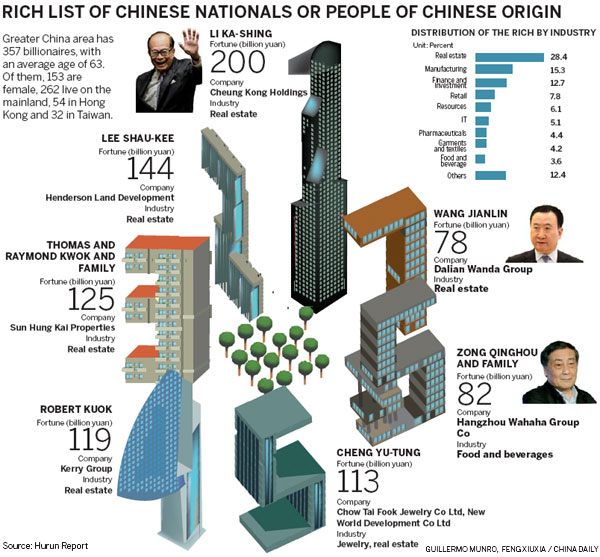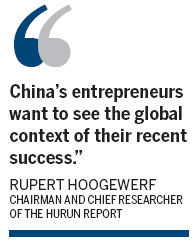China's billionaires on rise
Updated: 2013-03-01 09:54
By Wang Zhuoqiong (China Daily)
|
|||||||||||

Hurun Report finds Asia is home to highest number in elite group
China has had more billionaires created by its stock markets this year than in the United States - 212 compared with 211 - a new survey revealed on Thursday.

According to the latest Hurun Global Rich List 2013, there were 1,453 people in the world with personal wealth of $1 billion or more at the end of January.
Another significant sign of more wealth being created in the East came with figures showing Asia was home to the highest number of billionaires, with 608, followed by 440 from North America and 324 from Europe, said Hurun researchers.
Among individual countries, the US and the Greater China area dominated with 408 and 357 respectively, followed by Russia, Germany and India.
Between them, the US and China now have half of all billionaires on the planet.
Moscow, with 76 billionaires, is the billionaire capital of the world, followed by New York, Hong Kong, Beijing and London, according to the report.
Mexican telecom czar Carlos Slim, 73, was ranked as the "Richest Man on the Planet" with a personal fortune of $66 billion, followed by US investor Warren Buffett with $58 billion in wealth.
Founder of fashion brand Zara, Amancio Ortega of Spain, shoots into the top three with $55 billion in wealth.
Real estate, telecommunications, media, technology and retail were the most common sources of wealth, the report added.
But Rupert Hoogewerf, chairman and chief researcher of the Hurun Report, said for every billionaire that the Hurun Report has found, he estimates to have missed at least two, meaning there are probably 4,000 billionaires in the world.
It is the second time the research unit has put China's rich into a global context.
"China's entrepreneurs want to see the global context of their recent success," said Hoogewerf.
"With the list, we want to make them more known internationally and help them understand who they are compared against."
The report found that billionaires in China have an average age of 63. Of the total 357, some 153 are female, 262 live on the Chinese mainland, 54 in Hong Kong and 32 in Taiwan.
Hong Kong tycoon Li Ka-shing kept his title of Asia's richest man with $32 billion, the seventh wealthiest person in the world.
"In China, we've seen a huge urbanization boom and that has created a lot of wealth in property," said Hoogewerf.
The 68-year-old beverage tycoon Zong Qinghou, chairman and CEO of Hangzhou Wahaha Group, the leading drinks company in China, is ranked as the richest man on the mainland, with a wealth of 82 billion yuan ($13 billion).
Last year, Zong attracted huge attention by sending several investment teams to Europe in a quest to buy luxury products to sell at his new shopping center in Hangzhou.
Ren Weifeng, corporate brand director of Hangzhou Wahaha Group, said being recognized as the richest man on the Chinese mainland will help promote business abroad.
"Mr Zong didn't pay too much attention to such a title. But his increasing number of overseas trips has made him begin to realize the benefits of such recognition," he told China Daily.
Ranked second on the Chinese mainland list is Wang Jianlin, 59, a real estate entrepreneur with a wealth of 78 billion yuan.
In 2012, his company, Dalian Wanda Group Co Ltd, acquired AMC Entertainment Holdings Inc, a leading US movie exhibitor, creating the world's largest theater chain operator.
"Chinese entrepreneurs are preparing their international expansion plans," said Hoogewerf. "It is a very new concept but growing very fast."
He compared Wang's wealth with Nike founder Phil Knight and Paul Allen, the founder of Microsoft. The three of them are valued at around $12 billion on the list.
"We are trying to evaluate and compare them against the rest of the world," said Hoogewerf.
An accountant by training, Hoogewerf previously compiled the acclaimed Forbes rich list.
He said the survey methods included examining public information such as stock market reports, scouring artwork purchase records and tracking down philanthropical activities.
AFP contributed to this story.
wangzhuoqiong@chinadaily.com.cn
Related Stories
Who wants to date a billionaire? 2012-12-26 17:45
Billionaire quits district post 2012-11-29 07:18
Billionaire Li Baohua detained in Xiamen 2012-08-02 10:46
Guangzhou: Wives selected for billionaires 2012-05-21 16:41
Billionaire's death was murder, claims brother 2011-12-28 13:54
Today's Top News
Police continue manhunt for 2nd bombing suspect
H7N9 flu transmission studied
8% growth predicted for Q2
Nuke reactor gets foreign contract
First couple on Time's list of most influential
'Green' awareness levels drop in Beijing
Palace Museum spruces up
Trading channels 'need to broaden'
Hot Topics
Lunar probe , China growth forecasts, Emission rules get tougher, China seen through 'colored lens', International board,
Editor's Picks

|

|

|

|

|

|





